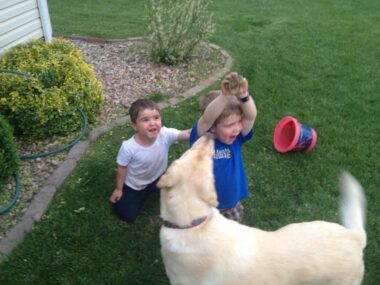Caregiving for sons with DMD is like being a frog in boiling water
Although I've had time to adapt, it doesn't make my situation any easier

One of my favorite early-summer memories is from when my sons Max and Rowen were younger. Both lovely little boys — one blond-haired and blue-eyed, the other dark-haired and brown-eyed — squealed with laughter upon discovering a frog in our front yard.
Max held the frog up in his hands and away from our yellow lab, which was excitedly trying to get a sniff of the foreign amphibian. Rowen knelt in the grass, waiting for his turn to hold it. I will share a photo with you, but I vividly recall that moment. It’s embedded in the lining of my heart and, therefore, my memory.

From left, Rowen and Max Vertin are pictured in 2010, shortly after their diagnosis of Duchenne. (Photo by Betty Vertin)
Today, Max, 18, Rowen, 15, and my son Charlie, 12, are all living with Duchenne muscular dystrophy (DMD). Max and Rowen had recently been diagnosed when they found the frog, and that kind of “typical” experience gave me a reprieve from my grief, pulling me from my sadness. The frog episode was one of those magical moments that kept me lifted until I could regain my footing after their DMD diagnosis.
The slow boil of DMD progression
More recently, frogs reentered my life — this time in another form of respite. I was talking on the phone with someone from a personal care company we’re trying to get Max set up with. The woman shared her husband had suffered a stroke, and as his full-time care provider, she utilized the agency she worked for.
She told me this to demonstrate that she understood our life. The voice on the other end of the line said that it was challenging to manage caregiving for one person, and complimented me on being able to handle caring for all three of my sons with DMD.
As always, I struggled to accept that my situation was even more demanding and challenging than another caregiver’s. And, as I often reply, I told her that Duchenne is progressive and that becoming a caregiver has been a gradual process, allowing me time to figure it out.
In return, she shared something that had a profound impact on me: the story of the boiling frog. If you throw a frog into a pot of boiling water, it will be alarmed and try to hop out. But if you put that frog in a pot of room-temperature water, and then slowly bring it to a boil, the animal has time to adapt and may not realize what’s happening until it’s too late.
It might have been the most honest thing anyone has ever told me about caregiving. Caring for three young men with DMD is hard. And just because I’m able to do it doesn’t mean the water isn’t boiling. Hearing the woman talk about that poor frog helped me to admit that my situation is hard.
Being a caregiver comes with many demands and responsibilities. Critical decisions can often seem impossible, such as deciding on a clinical trial or therapy. I must keep track of medical records, prescription refills, appointments, and paperwork. The job is physically demanding, requiring lots of lifts and transfers, and it becomes more challenging as my sons and I get older.
I didn’t realize I’d been waiting for permission to admit that caregiving is hard and to give myself grace in overwhelming moments. I was afraid that admitting this would make it seem like I didn’t want to be a caregiver. But the truth is that the difficulty level will never be greater than my love for my sons.
I’m not sure why it was hard to admit that I’m the one in a pot of boiling water, but it’s important that I’ve recognized it.
I’m years past needing a break from the grief of my sons’ diagnosis. I’m years past having little boys. My sons are now young men who have more needs than ever. But we have a good life, and admitting that it’s challenging doesn’t take away from that.
Note: Muscular Dystrophy News Today is strictly a news and information website about the disease. It does not provide medical advice, diagnosis, or treatment. This content is not intended to be a substitute for professional medical advice, diagnosis, or treatment. Always seek the advice of your physician or another qualified health provider with any questions you may have regarding a medical condition. Never disregard professional medical advice or delay in seeking it because of something you have read on this website. The opinions expressed in this column are not those of Muscular Dystrophy News or its parent company, Bionews, and are intended to spark discussion about issues pertaining to muscular dystrophy.






Sobha G
Hats off to Ms Vertin and thank you for sharing your feelings. We have a son, suffering from Beckers muscular dystrophy and progressively getting weaker. We hope there will be treatment available during his lifetime. Yes. We need to celebrate life a little more than what we do, and you inspire many.🙏